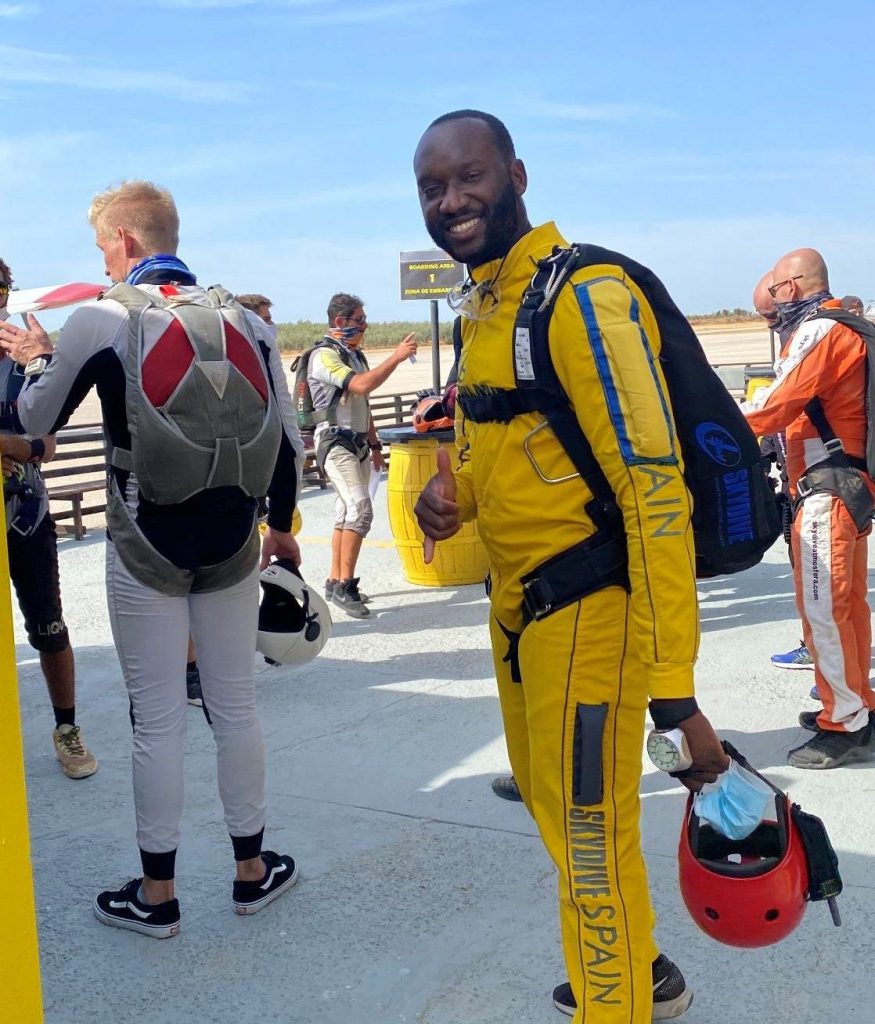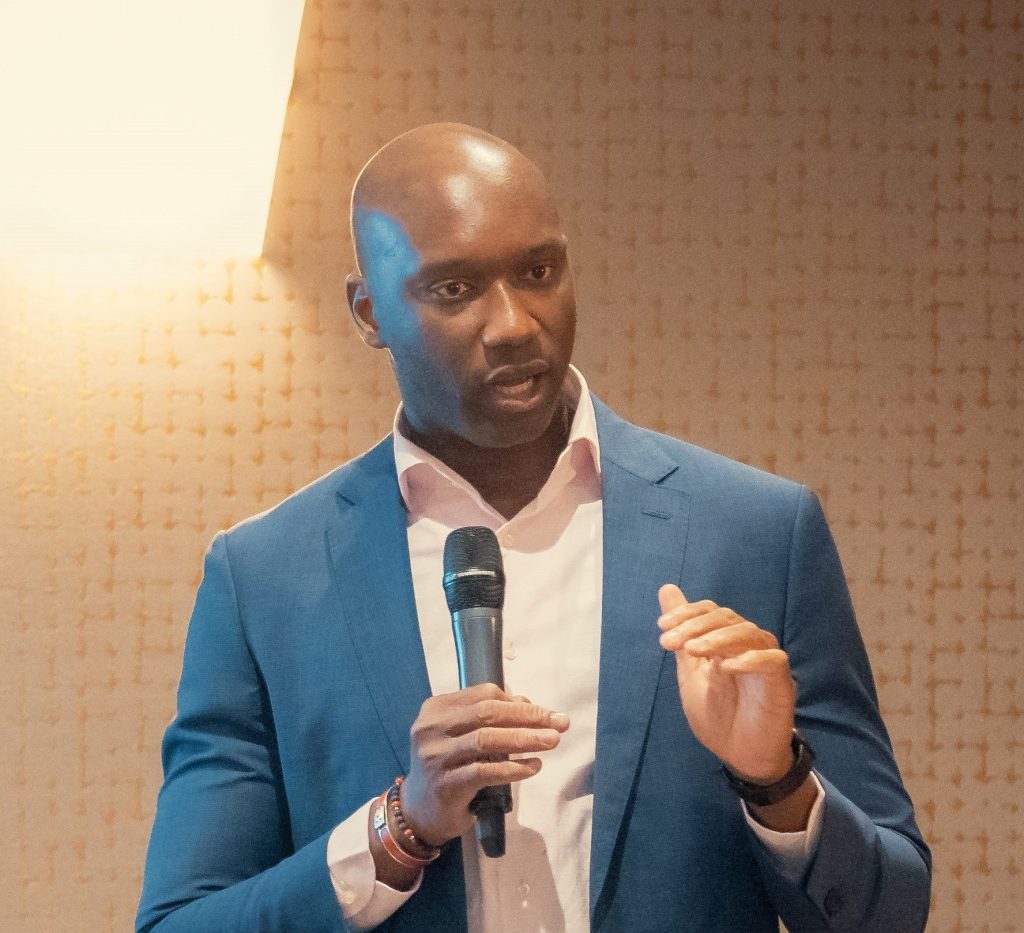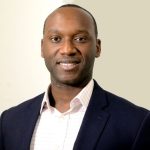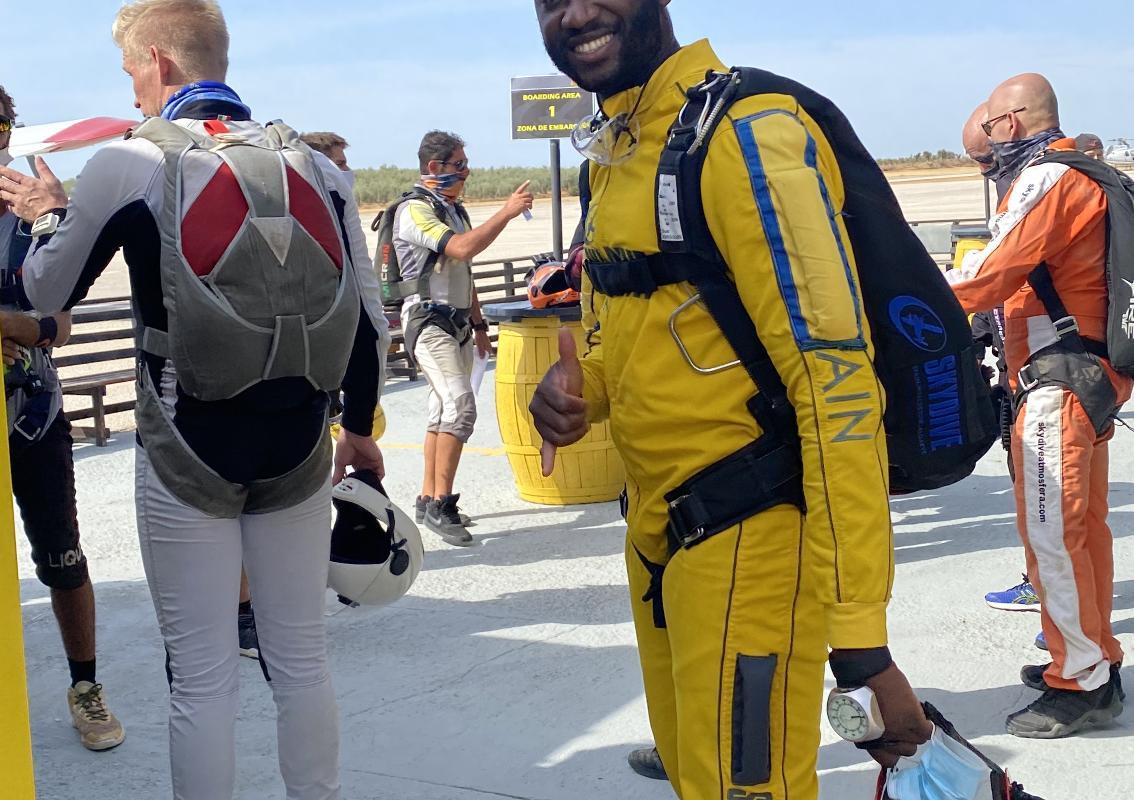
portrait
When he isn’t diving out of perfectly good airplanes, he’s dreaming even higher. But Ugo Ikpeazu isn’t building rocket engines. Instead, he is working toward a world where technology serves humanity dreaming up new systems for a digital social contract that monetizes our most valuable resource, time, in order to free humanity from dreary nine-to-fives, and unleashing their creativity to advance science, medicine, and art. His book, “Philosophy of Digital Currencies”, outlines his vision of the future..
Practical over theoretical
After testing out public schools, Ugo Ikpeazu made the change to join the EU Business School where he began working towards a Bachelor of Arts in International Relations. He chose to privilege practical education over the purely theoretical.
On top of smaller class sizes, the EUBS also boasted lecturers with practical in-the-field experience who were leaders in their fields. This practical education would be the hallmark of his education for the next eight years.
Taking care of business
For someone who dreams of visiting every country on the planet, international relations was a logical place to start. The unique advantage, for Ugo, was the business bent of the programme, focusing on geopolitics and the connections with global trade and international business.
After completing his degree in 2015, Ugo began working towards an MBA in Leadership from the EUBS. This allowed him to explore the role of a leader in driving innovation and growth in a changing business environment.
Ugo then enrolled in theUniversity of Roehampton ,London, where he acquired an MSc in International Management. While the MBA had taught him to bring a lot of different concepts together, it was the MSc that gave him the concrete tools he needed.
“At the time, I was conducting a research study for an organization in 5 countries, so I was able to literally take some of the things I was learning and apply them directly to the work that I was doing.”
Practical knowledge and practical experience
In 2018, Ugo re-enrolled in the the EU Business School, to work toward a PhD in Business Administration. While researching and developing the theoretical basis for his doctorate, the evolution of the social contract, he was also acquiring significant professional experience internationally.
He worked with the EUBS to team host a conference in 2018 on using public and private partnerships to unlock new value. Simultaneously, he was working with Geneva-based Gavi to increase engagement within the private sector for international organizations, building partnerships to bridge gaps in healthcare systems.
For five years, five months, and five days, Ugo continued to work with Gavi to foster partnerships with industry leaders across the African continent and parts of the Middle East.
He was also helpingONResearch, EU Business School’s dedicated research institute, define research strategies, run insights looking at industry-based subjects and host forums and an interview series with business leaders from around the world looking at contemporary issues.
Birth of an idea
Since 2015, Ugo had been rolling around the idea of creating atravel rewards program that would be based on time rather than distance. As his studies progressed, he began to reflect on a coming “digital social contract” and digital currencies.
While working on his doctoral thesis, he realized that these ideas could work together create a new system to improve the lives of people everywhere, especially in developing countries.
“It was some of the most exciting, intellectually stimulating years, so far.”
Philosophy of digital currencies
One of the core ideas underpinning his book,“Philosophy of Digital Currencies“, is the idea of monetizing time.
He explains, ““If time is the most valuable thing we have, then why not make it a currency… That’s where the two ideas came together, a digital social contract based on a digital currency that is the most valuable thing we all have access to, which is time.”.
For example, take cleaning up a particular part of a street. The community agrees that the work is valuable, but no one is necessarily willing to pay to have the street cleaned. By harnessing big data analytics, AI, and the blockchain, real-time calculations can be run to tie every specific unit of time spent creating value to a digital currency. The person who carries out the cleaning will be rewarded in a digital currency that can then be used to make transactions.
“I’m basically proposing a similar model of the gold standard, where every unit of currency is tied to a unit of value that was created in an economy.”

Money, by any other name
According to Ugo, money is three things : a storer of value, a means of exchange and a unit of account. Anything that acts as a storer of value and a means of exchange can serve as money. ““In different points in history it was tulips, tulip mania in the Netherlands, cowhides at some point in China, metal plates… Money is anything that a group of people can agree has these characteristics and are willing to use to exchange value“.
In modern days, cryptocurrencies are a lot like fiat money; they aren’t tied to any commodity. The big benefits are that they are decentralized, better protected, and offer user privacy. They offer a new perspective on what money is and can be, but they don’t redefine what money inherently is.
Cryptocurrencies or digital currencies?
Ugo isn’t convinced that cryptocurrencies will play a major role in the developing world. They require infrastructure and price systems to already be in place in order to enable peer-to-peer value transfer. In places where infrastructure is lacking, or in low-income economies, there is a risk that individuals will be alienated by cryptocurrencies or fall victim to malicious actors.
He suggests that some level of regulation is still required. Digital currencies that aren’t fully decentralized, cryptographic or community managed would be a better fit for low-income and developing economies. They provide some peer-to-peer value transfer, while allowing for centralization needed to strengthen the broader ecosystem.
““I think technology needs to be used to improve the state of the world… That’s the big benefit of digital currencies, it can create a level of financial empowerment that allows people to improve their living conditions by simply having access to a mobile device.“
Building a better tomorrow
For Ugo, the ability to earn basic subsistence living by creating value outside of usual systems is a huge benefit. “We would have more people spending time on art and creativity. We would have more people who would be applying their creativity to science.”.
He believes science moving just a little faster would make us a multiplanetary species much sooner. And, as the founder of virtual art gallery Ferrumhe doesn’t dismiss the benefit of art, either.
Benefiting students
He’ll be lecturing at Omnes schools on the subject. He believes that students could benefit from his book.Philosophy of a digital currency” in two ways. They could engagewith the idea of time as a currency, conceptualizing technologies and the broader ecosystem required to function, or else benefit from his research and approach.
The book covers political and economic theory and real-world sustainable development goals and field research. He hopes it will shed light on the importance of interdisciplinary research. “I think there is a big push to specialize in one particular thing, which is great, but if everyone specializes in one particular thing, who is going to bring the different silos and the different ideas together?”.
Son conseil ? “Ne fuyez pas les sujets difficiles et stimulants… Et trouvez un mentor dès le début.“

Ugo IKPEAZU
ALUMNI EUBS


